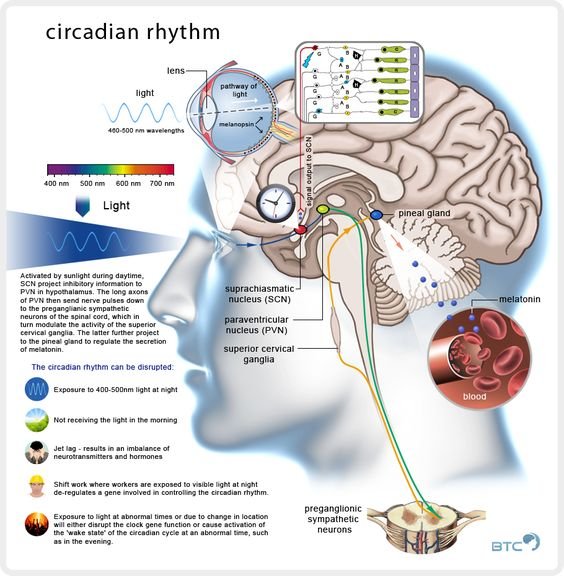
Isn't it crazy how time works? Sometimes it just won't pass and an hour feels like half a day, and other times time just flies by and something is over before we know it.
Funny enough, our bodies always have their own perception of time - our inner clock.
So how exactly do we perceive time, how do our bodies know what time it is?
Sleeping and waking patterns in our bodies
What controls our sleeping and waking times throughout the day is the circadian rhythm.
It's our natural cycle of sleeping during the night and being awake and active throughout the day.
This rhythm is controlled by the SCN - the suprachiasmatic nucleus, an area inside our hypothalamus.
Light plays a huge factor in our circadian rhythm, and the SCN is actually connected to the optic nerves, so it receives signals about the light around us.

When we wake up in the morning, ideally light is being sensed by our eyes, our blood pressure and heart rate increase, the body temperature rises, and hormones like melatonin or the neurotransmitter norepinephrine are being released, which makes us feel active and awake.
Our concentration and brain functions spike soon after, which is why we're most productive in the late mornings, a few hours after we woke up.
Then, we face a typical afternoon low between 2-3pm (which is right after lunch as well - that doesn't help!), then we get another attention high, and after around 6pm when the sun sets we slowly get more and more tired until we finally go to bed again.
The only problem is that nowadays, most people don't depend on the times for sunrise and sunset anymore - our work times have shifted, which is why it can be quite hard to adapt to that sometimes.

CLK - Theory
There is another theory about our sleeping and waking patterns, and it's linked to a protein called CLK - or "clock".
This protein accumulates in the SCN brain region throughout the day. It makes us feel awake, and it's also responsible for the creation of another protein called PER.
When enough of this protein PER is generated, the gene that produces CLK is being deactivated - this makes us tired, and eventually fall asleep.
Then the clock falls low and PER concentrations also drop again - allowing CLK to "catch up" rise again, starting the cycle again.
Our inner stopwatch
We seem to have quite a good feeling about how long a second is - most of the time.
How can our bodies know that?
Scientists suggest that the communication between neurons always takes roughly the same amount of time.
So it's possible that our neurons connect in a predictable, scheduled loop - allowing our cortex to get an idea of how many seconds have passed.

The cave experiment
In 1962, french scientist and cave explorer Michel Siffre decided to stay in an underground cave, isolated from the world, clocks, or any daylight, and see how the body's inner clock would react.
He was monitoring his vital signs, and kept track of when he ate and slept.
Even without any signal from outside and without any external clues about the time, his body managed to eat and sleep at fixed patterns.
What's interesting though, is that he adapted a 48 hour rhythm: He was awake for around 36 hours straight, and then slept for 12-14 hours at a time.
Also, his own perception of time warped:
Everyday, he counted to 120 at the rate of what he thought was 1 digit per second.
Around the end of the experiment, it took him 5 minutes instead of 2 to count to 120 - showing that his inner stopwatch that I mentioned above was manipulated by the total isolation.
So this proves that our inner clock remains even without any external signals, but it can decrease in accuracy the longer we go without them!
Images: 1, 2, 3, 4, Sources: 1, 2, 3, 4
- Instagram -

© Sirwinchester
Alga-rhythms - I think mine is on a dub-step beat :D
My internal clock is not quite as it should be!
Haha, yes that might happen! everybody's different, although dubstep is very unique ;)
I know, then again.... SO AM I
Thank you for the great post!
Wishing you a spectacular night!
Yes, you definitely are!
Thank you, and hope you have a great rest of the night as well!
And while we are at it, just want to throw in that I am really very happy for you that you are doing so well on Steemit. You have been one of the first people that I started following on Steemit when I started posting on this site. And your success here is very well deserved in my personal opinion!
For what its worth!
that poor scientists that had to live in a cage for months! I'm surprised he didn't have mental issues after this period of isolation?
anyways, very interesting topic, and especially the part about our inner stop watch was totally new to me! guess you always learn something new!
He did have to deal with depression and anxiety afterwards..
Thank you yes we never stop learning and there's always something new to discover!
I feel like sunlight really helps me to feel awake and less groggy in the mornings, the first I like to do when waking up is open the blinds and get some light and fresh air! But in return, it's sooo hard to get out of the cozy warm bed when it's winter time and stlll dark outside..
Sunlight and cold, fresh air are a great trick for waking up!
And during the winter time, try switching the light on immediately and still open the window for at least 1-2 minutes, despite the cold!
Omg, I didn't read this right away cuz I was like "I know what he's going to say..."
But this: "What's interesting though, is that he adapted a 48 hour rhythm: He was awake for around 36 hours straight, and then slept for 12-14 hours at a time."
I totally do this.
I've done a lot of looking up about sleep and the like, but I've never seen this anecdote before.
You just wrinkled my brain.
That's so interesting that you've experienced it yourself!
Just google the name Michel Siffre to find out more, he did several of these experiments though. But that statistic was a result from his first one I believe.
Awesome. Thanks for the interesting lead. Another rabbit hole to explore.
This post has been ranked within the top 10 most undervalued posts in the first half of Dec 12. We estimate that this post is undervalued by $21.96 as compared to a scenario in which every voter had an equal say.
See the full rankings and details in The Daily Tribune: Dec 12 - Part I. You can also read about some of our methodology, data analysis and technical details in our initial post.
If you are the author and would prefer not to receive these comments, simply reply "Stop" to this comment.